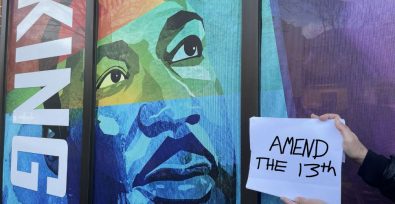In 1963, Martin Luther King wrote the “Letter from Birmingham Jail”, which, more than sixty years later, speaks eloquently to the issues of that time and today. Dr. King’s compelling discourse, written from the confines of a jail cell, aligns with the prison epistles of St. Paul and the writings of visionary figures like Thoreau, Gandhi, and Mandela – all of whom found inspiration behind bars.
The contemplation of these writings, and these lives, invites us to grapple with enduring questions that span human history: who faces imprisonment, and for what reasons? How are those within the prison system treated, and what is our duty to those who are incarcerated? And this leads us to the 13th Amendment and its unsettling Punishment Clause.
While every American is taught that the 13th Amendment abolished slavery, fewer are acquainted with its Punishment Clause, which provides a huge exception to the abolition of slavery and involuntary servitude: “as a punishment for a crime whereof the party shall have been duly convicted.” In essence, it sanctions the enslavement of individuals upon conviction, an archaic relic that has persisted since the Northwest Ordinance of 1787.
The Punishment Clause was written at a time when society condoned slavery
In the late 18th century, when the Punishment Clause took shape, society condoned slavery and hanging, flogging, and branding might be meted out as punishment. The Northwest Ordinance, intended to bring legal oversight to new territories, deemed slavery forbidden – except as punishment for a crime.
Slavery is the ultimate effort at human degradation. In the eyes of the enslaver, a person becomes an object without free will. It must be presumed, therefore, that this is the intent of the Punishment Clause, which remains the law of the United States today, perpetuating an injustice that Dr. King ardently condemned in his Letter: “Any law that degrades human personality is unjust.”
There are efforts across the United States to abolish the Punishment Clause in the 13th Amendment. States like Alabama, Colorado, Nebraska, Oregon, Tennessee, Utah, and Vermont have already taken strides in this direction with their state constitutions. At the federal level, Senate Joint Resolution 33 and House Joint Resolution 72 propose an amendment that would erase this stain from our constitutional fabric.
There are numerous political, legal, criminological, and sociological reasons to end the Punishment Clause. As we navigate the 21st century, societal norms have evolved, rendering the once-acceptable practice of “enslaving” incarcerated persons abhorrent. The Punishment Clause mirrors the thinking behind the infamous “Black Codes,” contributing to the exploitation of black Americans as prison labor in the 19th and 20th centuries.
By maintaining the 13th Amendment as is, the United States is undercutting its own standing in the community of nations while it argues for universal human rights on one hand but permits legal slavery on the other. This is also a contradiction of America’s own Tariff Laws by which the importation of goods produced by forced prison labor are prohibited from entering the country.
Some might even ponder the Judeo-Christian teachings that Dr. King relied on throughout his Letter to ask how can people whose faith exhorts them in Isaiah 58:6 to “break every yoke”, nonetheless embrace laws that permit prisoners to be made slaves?
It’s time to Amend the 13th – as Dr. King would have wanted
We believe that were Dr. King contemplating the 13th Amendment today he might well accept any or all of the arguments set forth above. We believe, however, that Dr. King would ground his support to amend the 13th Amendment on a fundamental concept: It is unjust to attempt to reduce a human being to an object. Whatever a person’s crime, that person is a human being at the moment that they enter the prison system, during every day of incarceration, and on the day that they leave.
Dr. King and the others set forth above are renowned for their vision and leadership both before, during, and after their incarcerations. This statement, however, acknowledges the hundreds of thousands of persons of lesser renown who have been, are, and will be incarcerated in American prisons.
Today, in honoring the legacy of Dr. King, we call for support of Senate Joint Resolution 33 and House Joint Resolution 72, urging the U.S. to amend the 13th Amendment and similar provisions in state constitutions.
It is time to end legal slavery once and for all.







makes a lot of sense especially when you see who are in the US prisons providing slave labour.
Community-oriented policing now impresses labor without trial. Citizens are being accused, displaced, and diverted into coordinated entry programs that obstruct civil remedy and legal pathways to housing. They are left in a state of limbo, denied process of the law, and blamed for their own economic ruin. Statutory allocations meant to protect individual rights and prevent homelessness are diverted into generalized national funding programs that enrich discretionary salary earners (non-profit).